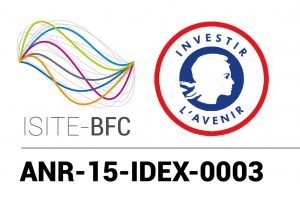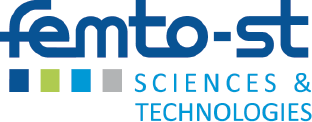Innovation through
Physics and Engineering
Innovation through Physics and Engineering
Innovation through
Physics and Engineering
Innovation through Physics and Engineering
 Master in Engineering Physics & Advanced Photonics Technologies (EPhoT)
Master in Engineering Physics & Advanced Photonics Technologies (EPhoT)
The Master EPhoT program provides a comprehensive program of courses covering theoretical, experimental and engineering aspects of photonics, micro/nano technologies, machine learning, time-frequency metrology, information theory and complex systems. It is designed to cover a selection of topics at the interface of physics and engineering sciences, closely integrated with domains of research excellence developed in the Region of Bourgogne Franche-Comté (BFC). The master’s program also provides complementary courses in disciplinary and interdisciplinary knowledge, as well as broad digital, societal, cultural, environmental, and entrepreneurial skills.
It is open to students with undergraduate physics degrees, and it aims to provide complementary courses to prepare students for careers in either industry or for future PhD level studies. The PICS masters is strongly supported by the FEMTO-ST Institute and the ICB Laboratory, research institutions with major international reputations in Physical Sciences and Engineering. The EPhoT Master’s program has received a national label as a Master’s of Excellence for Engineering and Research, entitled CMI (“Cursus master en Ingénierie”) which is delivered by the CMI-FIGURE network which consists of 28 universities in France.
Photonics and nanotechnologies are one of the 6 Key Enabling Technologies identified by the European Commission as sources of innovation and competitiveness for the future. They are technological sectors that feed competitive and fast-growing markets (environment, health, automotive, safety, etc.) and there is a strong need for qualified graduates to support developing European Industry. When compared to other French Masters programs in similar fields, the particular novelty of the Masters EPhoT is that it focuses on teaching multi-disciplinary skills on both the practical and fundamental level in a very wide range of topics: photonics, micro and nano-optics, quantum optics, micro-nanotechnologies, instrumentation, artificial intelligence and machine learning, time-frequency metrology, micro-oscillators, micro- and nano-acoustics, bio-photonics, and complex systems.
The FEMTO-ST and ICB Institutes are the underlying laboratories that support the master EPhoT program. The FEMTO-ST Institute in Besançon (femto-st), with more than 750 staff, is one of the largest laboratories in France in Engineering Sciences, having high international visibility in photonics, nanotechnology and time frequency technology. The ICB Institute in Dijon (icb bourgogne), with a staff of 300 people, is also an underlying laboratory of the EPhoT master’s. The EPhoT master’s program is based on the internationally highly recognized research activities of all these laboratories in photonics, micro & nanotechnologies, time-frequency and complex systems, with teaching and supervision being performed by renowned and highly qualified researchers (professors, assistant professors, or full-time CNRS researchers).
The courses, taught in English, are divided between lectures, exercises/tutorials, practical labs and project activities. Students will be immersed in the labs from their 1st year of study, closely connected with the research groups via lab projects that will run throughout semester 1 to 3. Individual supervision will be provided to all students, combining a personal project advisor and a mentor.
A one-semester research internship in semester 4 can be carried out at FEMTO-ST, ICB, or a local or national industry partner. Students also have the possibility to obtain significant international experience by carrying out Master’s Internships (5-6 months) abroad at internationally-renowned universities having strong research collaborations with FEMTO-ST and ICB. The proposed EPhoT Master’s program is also based on strong interactions with high-tech industrial partners both at the local and international levels.
The EPhoT master’s program takes place over 2 academic years divided into 4 semesters. Each semester corresponds to an accreditation of 30 ECTS, which leads to a total at the end of 120 ECTS. The program has an extensive international flavor, with all courses taught in English, except two modules of 3 ECTS in semesters 1 and 3 that will introduce French culture and language for foreign students, and organized in close connection with another master’s programs. We offer the opportunity to obtain French language certification (B2 at minimum). The teaching staff are highly qualified researchers with international recognition and all teaching staff are fluent in English, with many at native or near-native level.

| Master 1 Fall Semester | Master 1 Spring Semester |
Non-Linear Optics Material physics Quantum Physics Machine learning, signal processing and statistics Organizations, human being & the challenges of environment Lab skills in applied physics English/French Research Project | Laser Physics Solid-State physics Quantum Optics & Light-Matter Interaction Guided Optics Noise Detection and Control Micro Nano fabrication & Clean Room English/French Research Project |
| Master 2 Fall Semester | Master 2 Spring Semester |
Nano-Optics Advanced Numerical Methods in Photonics Advanced Nonlinear Optics Advanced Instrumentation Advanced Quantum Optics Metamaterials & multiphysical couplings Ultrafast Optics English/French & Soft Skills Artificial intelligence and applications | Research Internship hzsrthsrkgiklglggjkgjthsrthsrths |


The program targets careers such as:
Bachelor’s degree (3 or 4 years degree) of Science or its equivalent; background in general physics, optics, electromagnetism, and quantum physics is mandatory. Courses waivers can be given depending on your former undergraduate program content. Candidates must have very good academic qualifications and a very good practice of English.
Many scholarships will be awarded each year to high quality foreign students.
Besançon is a historical town with a strong university community, and is consistently voted as having an excellent quality of life. It is home to a UNESCO-World Heritage listed citadel and fortifications, and is well known for its proximity to an excellent range of outdoor pursuits including hiking, mountain-biking, skiing and rock-climbing.
The site of training is Besançon, a French old city that combines old stones buildings, French culture, various activities from sports to cultural, and students life.
Approximately 10% of the population are students or interns in Besançon city and in its agglomeration.
The center of applied languages (CLA) which is a part of the university is one of the most important center for learning languages in France and hosts approximately 4000 interns per year coming from various countries for some days or for several months.
Public transportation is very practical and the old-city is doable by walks.
Contact: Nadège Courjal & Jerome Salvi